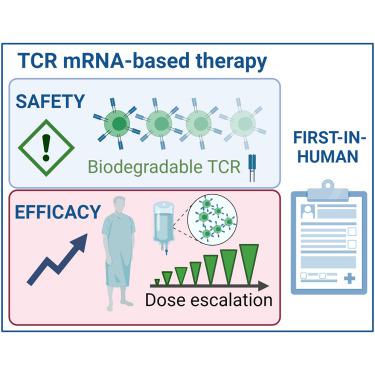当前位置:
X-MOL 学术
›
Mol. Ther.
›
论文详情
Our official English website, www.x-mol.net, welcomes your feedback! (Note: you will need to create a separate account there.)
Transient TCR-based T cell therapy in a patient with advanced treatment-resistant MSI-high colorectal cancer
Molecular Therapy ( IF 12.4 ) Pub Date : 2024-04-06 , DOI: 10.1016/j.ymthe.2024.04.009 Solrun Melkorka Maggadottir , Svein Dueland , Nadia Mensali , Hanne Hamre , Per Arne Andresen , Marit Renée Myhre , Hedvig V. Juul , Iris Bigalke , Marianne Lundby , Turid Kirsti Hønnåshagen , Stein Sæbøe-Larssen , Dag Josefsen , Trond Hagtvedt , Sébastien Wälchli , Gunnar Kvalheim , Else Marit Inderberg
Molecular Therapy ( IF 12.4 ) Pub Date : 2024-04-06 , DOI: 10.1016/j.ymthe.2024.04.009 Solrun Melkorka Maggadottir , Svein Dueland , Nadia Mensali , Hanne Hamre , Per Arne Andresen , Marit Renée Myhre , Hedvig V. Juul , Iris Bigalke , Marianne Lundby , Turid Kirsti Hønnåshagen , Stein Sæbøe-Larssen , Dag Josefsen , Trond Hagtvedt , Sébastien Wälchli , Gunnar Kvalheim , Else Marit Inderberg

|
We previously demonstrated the antitumor effectiveness of transiently T cell receptor (TCR)-redirected T cells recognizing a frameshift mutation in transforming growth factor beta receptor 2. We here describe a clinical protocol using mRNA TCR-modified T cells to treat a patient with progressive, treatment-resistant metastatic microsatellite instability-high (MSI-H) colorectal cancer. Following 12 escalating doses of autologous T cells electroporated with -transcribed Radium-1 TCR mRNA, we assessed T cell cytotoxicity, phenotype, and cytokine production. Tumor markers and growth on computed tomography scans were evaluated and immune cell tumor infiltrate at diagnosis assessed. At diagnosis, tumor-infiltrating CD8+ T cells had minimal expression of exhaustion markers, except for PD-1. Injected Radium-1 T cells were mainly naive and effector memory T cells with low expression of exhaustion markers, except for TIGIT. We confirmed cytotoxicity of transfected Radium-1 T cells against target cells and found key cytokines involved in tumor metastasis, growth, and angiogenesis to fluctuate during treatment. The treatment was well tolerated, and despite his advanced cancer, the patient obtained a stable disease with 6 months survival post-treatment. We conclude that treatment of metastatic MSI-H colorectal cancer with autologous T cells electroporated with Radium-1 TCR mRNA is feasible, safe, and well tolerated and that it warrants further investigation in a phase 1/2 study.
中文翻译:

基于 TCR 的瞬时 T 细胞疗法治疗晚期难治性 MSI 高结直肠癌患者
我们之前证明了瞬时 T 细胞受体 (TCR) 重定向 T 细胞识别转化生长因子 β 受体 2 移码突变的抗肿瘤功效。我们在这里描述了一种使用 mRNA TCR 修饰的 T 细胞治疗进行性、难治性转移性微卫星不稳定性高(MSI-H)结直肠癌。在用转录的 Radium-1 TCR mRNA 电穿孔 12 次剂量递增的自体 T 细胞后,我们评估了 T 细胞的细胞毒性、表型和细胞因子的产生。评估肿瘤标志物和计算机断层扫描的生长情况,并评估诊断时的免疫细胞肿瘤浸润情况。诊断时,肿瘤浸润 CD8+ T 细胞除 PD-1 外,耗竭标志物的表达极少。除 TIGIT 外,注射的 Radium-1 T 细胞主要是幼稚 T 细胞和效应记忆 T 细胞,低表达耗竭标记物。我们证实了转染的 Radium-1 T 细胞对靶细胞的细胞毒性,并发现参与肿瘤转移、生长和血管生成的关键细胞因子在治疗过程中发生波动。治疗的耐受性良好,尽管患者患有晚期癌症,但病情稳定,治疗后存活了 6 个月。我们的结论是,用电穿孔 Radium-1 TCR mRNA 的自体 T 细胞治疗转移性 MSI-H 结直肠癌是可行的、安全的且耐受性良好,并且值得在 1/2 期研究中进行进一步研究。
更新日期:2024-04-06
中文翻译:

基于 TCR 的瞬时 T 细胞疗法治疗晚期难治性 MSI 高结直肠癌患者
我们之前证明了瞬时 T 细胞受体 (TCR) 重定向 T 细胞识别转化生长因子 β 受体 2 移码突变的抗肿瘤功效。我们在这里描述了一种使用 mRNA TCR 修饰的 T 细胞治疗进行性、难治性转移性微卫星不稳定性高(MSI-H)结直肠癌。在用转录的 Radium-1 TCR mRNA 电穿孔 12 次剂量递增的自体 T 细胞后,我们评估了 T 细胞的细胞毒性、表型和细胞因子的产生。评估肿瘤标志物和计算机断层扫描的生长情况,并评估诊断时的免疫细胞肿瘤浸润情况。诊断时,肿瘤浸润 CD8+ T 细胞除 PD-1 外,耗竭标志物的表达极少。除 TIGIT 外,注射的 Radium-1 T 细胞主要是幼稚 T 细胞和效应记忆 T 细胞,低表达耗竭标记物。我们证实了转染的 Radium-1 T 细胞对靶细胞的细胞毒性,并发现参与肿瘤转移、生长和血管生成的关键细胞因子在治疗过程中发生波动。治疗的耐受性良好,尽管患者患有晚期癌症,但病情稳定,治疗后存活了 6 个月。我们的结论是,用电穿孔 Radium-1 TCR mRNA 的自体 T 细胞治疗转移性 MSI-H 结直肠癌是可行的、安全的且耐受性良好,并且值得在 1/2 期研究中进行进一步研究。



























 京公网安备 11010802027423号
京公网安备 11010802027423号